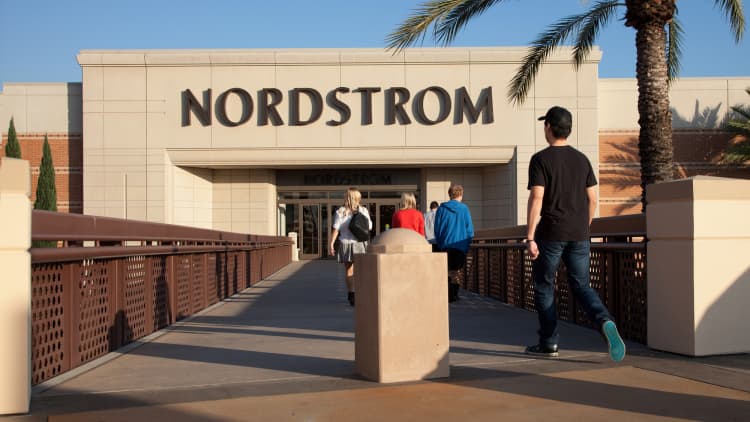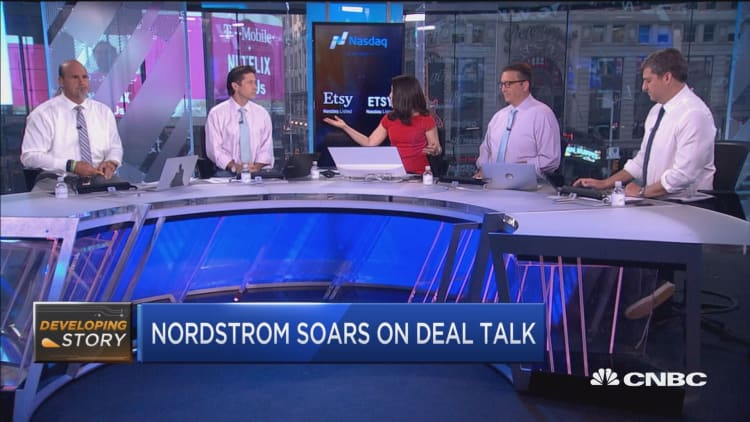
Leonard Green & Partners is considering taking part in what is one of the biggest bets on retail this year.
This is despite not getting the majority stake typically afforded private equity firms in buyouts. But Leonard Green has been down this road before.
CNBC reported Tuesday the PE firm is in talks to contribute roughly $1 billion to Nordstrom's bid to go private. The family group, which owns 31.2 percent of the 116-year-old retailer, said in June it was looking to take private and has been seeking a private equity partner to help fund the bid.
The potential investment comes as retail headwinds and private equity debt have thrown retailers such as Gymboree and Payless ShoeSource into bankruptcy and others such as Neiman Marcus into financial disarray.
It also comes without the typical trappings of a private equity buyout that provides a firm with full ownership and control. There were only two U.S. leveraged buyouts with a private equity minority stake last year, according to Dealogic.
"In private equity, we are looking to take control of companies so that we can affect change," said Francois Mallette, who heads consulting firm L.E.K.'s Private Equity practice.
"It's a lot cleaner if you have effective control to get what you want done on your timeline."
The Nordstrom family has been offering potential private equity partners preferred equity terms, but it is unclear what operational assurances they have offered. Such investments sometimes carry with them seats on the board, veto rights, say on executive picks or other key decision-making abilities. They often carry liquidity provisions, such as forced sale or rights to buy stock at a certain time, so the firm has continued opportunity to make money as it holds the investment.
Leonard Green has experience with such investments. The firm, founded in 1989, touts a "flexible approach to structure" as one of its five investing tenets
Whole Foods Market is its most famous example. Leonard Green took a 17 percent stake in the grocer in 2008. The investment, which kept CEO John Mackey in place, helped Whole Foods navigate the recession and the beginnings of a proliferation of lower-price competitors.
It also put Leonard Green Partner Jonathan Sokoloff on the board. Sokoloff, who later stepped down from the board amid pressure from activist investor Jana Partners, was likely still a shareholder in the grocer when Amazon acquired it for roughly $13.7 billion.
The firm has also made minority investments in Signet and Topshop. Its 2007 acquisition of The Container Store kept management on board as part of the deal.
This experience is likely to help in its negotiations with Nordstrom, said Carl Marcellino, a mergers and acquisitions partner at law firm Ropes & Gray, who is not involved in the process.
"When private equity firms try to negotiate minority investments for the first time, they can worry about everything — try to solve for every single possible situation or skeleton in the closet. That kind of negotiation can wear down a founder to the point in which they are worried about what kind of partner you'll be. The key is finding the right balance — to seek the right mix of economic terms and governance that is targeted at keeping the founder focused on executing the sponsor's investment plan."
To be sure, an investment in Nordstrom carries risk, whether it be majority or minority. While analysts view Nordstrom as best-in-class among the department store set, not all agree there will be department stores in a decade. It remains unclear what kind of financing package Nordstrom will be able to put together to fund any potential deal.
Leonard Green has felt its own share of pain amid the industry's woes. Sports Authority went bankrupt and liquidated last year, roughly a decade after Leonard Green's acquired it for $1.3 billion.
"You have to have conviction, for a deal like this," L.E.K.'s Mallette said.
"It is like the private equity folks that bought newspapers. They knew the knife was falling and they had a plan, but it was drastic surgery."
WATCH: What Nordstrom going private means to rest of retail



